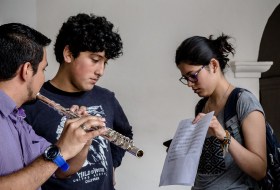News
Project of the University of Cauca included in the National Development Plan 2022
University - Tuesday, May 9, 2023
Project of the University of Cauca included in the National Development Plan 2022 - 2026
Last Friday, May 5, 2023, the Congress of the Republic approved the National Development Plan 2022-2026 "Colombia World Power of Life", a document of great relevance for all national actions. The good news for our department is that the Unicaucano project "Artistic Schools for Peace and Reconciliation in the department of Cauca" was included in it, which seeks to rebuild the social fabric of the communities affected by the conflict through art. .
The project "Artistic Schools for Peace and Reconciliation in the department of Cauca" is part of the strategy promoted by the Vice-Rector for Culture and Well-being of the University of Cauca, and whose main objective is aimed at connecting academic work with the realities and the artistic daily life of the communities in the Cauca territories, thus influencing the construction of Total Peace in the region, conceptually supported in the Political Constitution of 1991, which defines Peace as a fundamental right and as a constitutional duty.
The rector, Dr. Deibar René Hurtado Herrera, in this regard highlights that "In strengthening a University that is committed to peace, for us it turns out to be of great importance and cause for joy, the support of the National Government through the inclusion of this special project in the National Development Plan. The commitment to culture and art is also a commitment to recognize that we are plural and diverse, to make others aware and to find new ways to have a better future".
Statement on the inclusion of the project of the Vice-Rector for Culture and Well-being in the National Development Plan
This project is planned to be developed over the next four years in the municipalities of Inzá, Santander de Quilichao, Timbiquí, El Tambo, Patía and Almaguer, also having an itinerant point that will cover all those areas of municipalities, corregimientos and paths that are part of the dispersed rurality of our department, with the clear intention that this bet has the greatest possible coverage. Thus, its first phase consists of Training-Trainers, that is to say that diploma courses will be carried out that will be arranged directly with the community in their territories. The rector Hurtado Herrera, also assured that "the generation of training spaces that collect the knowledge, knowledge and practices of the communities and the University, is clearly a decision of collective construction of recognition of the other".
In this sense, the diploma courses will not be prepared solely from the University of Cauca, but will be the result and will be designed thanks to joint work with local authorities, artistic leaders, cultural managers and artists from each of the communities and will respond to the different forms of expression such as plastic arts, music, theater, dance, audiovisual, among others. "We put it this way because what we are looking for is that teachers, in rural areas, have the possibility of replicating that knowledge to children and young people who study in schools in rural areas, but we also seek to train people in terms of the administration of the arts, because we are interested in the schools being administered by the local inhabitants of the region themselves”, expressed the teacher César Alfaro, Vice Chancellor of Culture and Well-being.
The second phase of the project contemplates the installation of Artistic Residencies, since once the teachers have been trained, the idea is that the space becomes a place of feedback, where researchers in the arts, or from different disciplines, can develop their work generating a flow between the academy and the territorial areas, thus contributing to the reconstruction of the social fabric through the arts in those areas that have been seriously affected as a result of the historical and painful armed conflict. In this order of ideas, it is expected that the research processes that are carried out in the Artistic Residences, formulate higher education study programs in arts for rurality: "Precisely so that young people do not have to leave their places of life and they can be trained in their traditional artistic processes, with the materials and aesthetics of each of their territories”, concluded the teacher César Alfaro.
Undoubtedly, the inclusion in the National Development Plan of the project


